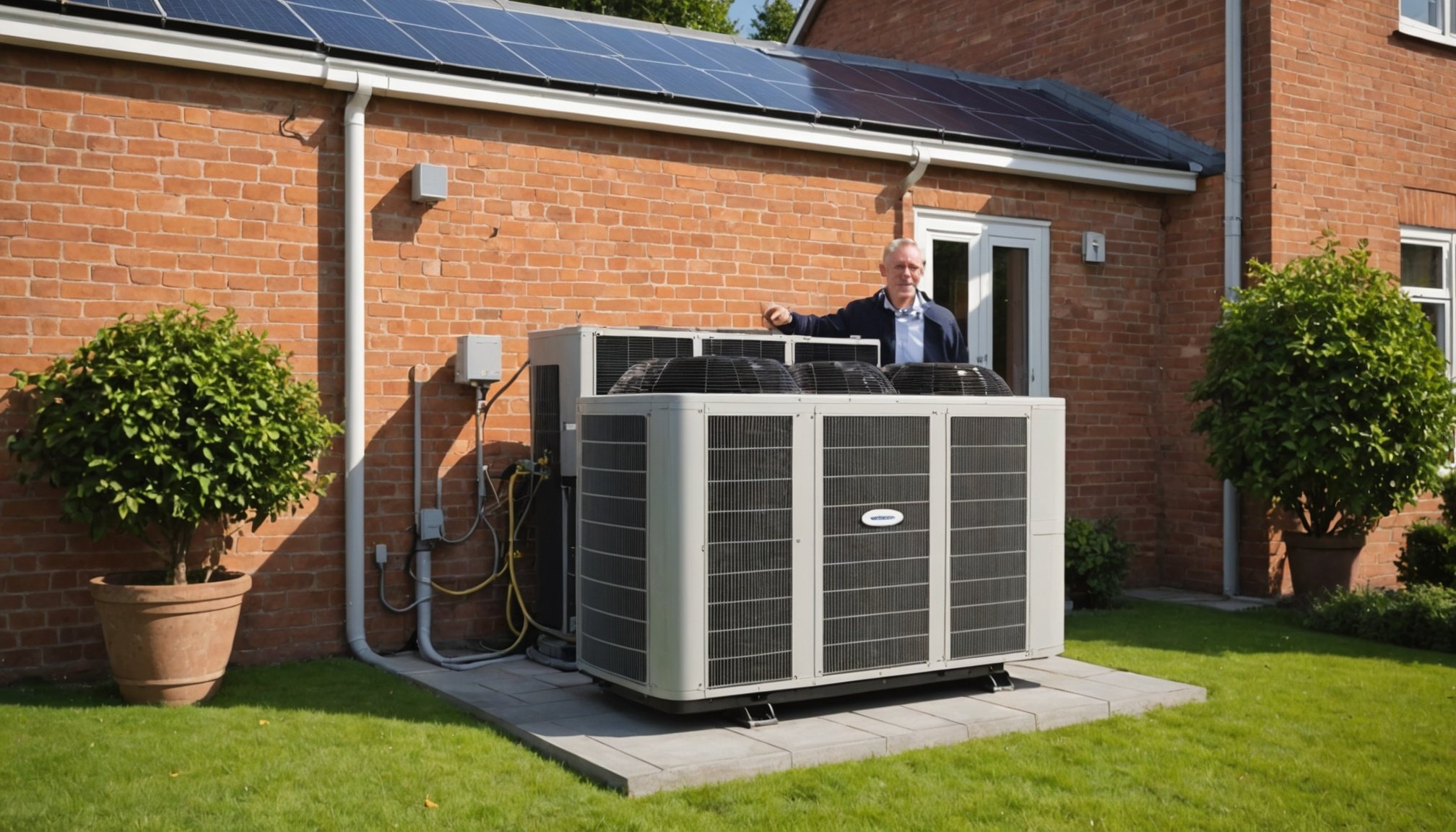Switching to a heat pump can cut your carbon footprint and energy bills—but the upfront cost often deters homeowners. The UK’s Boiler Upgrade Scheme offers grants of up to £7,500, making this transition affordable now. Understanding eligibility, proper installation criteria, and application steps empowers you to unlock these savings and modernise your heating system with confidence.
Overview of UK Government Heat Pump Funding Schemes
The UK government actively supports the transition to sustainable heating methods through a series of funding schemes, most notably the Boiler Upgrade Scheme (BUS). This initiative is designed to incentivize homeowners and small businesses to replace traditional fossil fuel systems with low-carbon alternatives like heat pumps, which transfer heat from outside sources using electricity.
In the same genre : Your local experts: solicitors in guildford for every need
Currently, property owners can receive grants of up to £7,500 for installing air source or ground source heat pumps. These grants are aimed at offsetting the typically higher upfront costs of installing such systems. The scheme prioritizes systems that meet specific efficiency standards and are installed by MCS-certified professionals, ensuring quality and reliability.
Recent funding levels reflect the government’s commitment, with the scheme’s budget increased from an initial £450 million to £1.5 billion, extending support until March 2028. The goal is to install 600,000 heat pumps annually from 2028 onward. To maximize eligibility, applicants should consult official resources like the OFGEM and government websites, which provide guidance on application procedures and updates on scheme terms.
Also to see : Elevate your home with custom bespoke rooflights today
The scheme’s focus is mainly on replacing outdated, high-carbon heating systems that rely on oil, coal, or non-renewable gas. Cost assistance is particularly significant since typical installation expenses range from around £11,000 for air source systems to higher costs for ground source options. The grants do not cover hybrid setups or systems exceeding 45 kW thermal capacity, ensuring subsidies support smaller, residential-focused upgrades.
You can view more details on this page: Government Incentives for Heat Pumps, which explains the eligibility criteria, application process, and latest updates in detail. The scheme also encourages complementary measures such as insulation upgrades to enhance heat pump efficiency—although these are no longer mandatory for grant eligibility since May 2025.
Government Incentives for Heat Pumps are a vital component of the UK’s broader commitment to net-zero emissions and green home initiatives. They provide essential financial support, making low-carbon heating technology accessible and appealing. This support not only reduces homeowners’ upfront costs but also aligns with energy efficiency goals, helping to trim energy bills over time.
The scheme’s structure emphasizes transparency and user support, with application handled by approved installers, ensuring clients understand the process and meet all necessary criteria. More information on how to benefit from these incentives is available through official channels, and qualifying households can benefit from additional local authority grants, further reducing costs.
Embracing these government incentives encourages a significant shift in home heating practices, contributing to the UK’s climate targets while offering practical financial benefits. The proactive use of Government Incentives for Heat Pumps enables property owners to adopt greener, more efficient heating systems with financial assistance and professional guidance, creating a sustainable future for generations to come.
Details of the Boiler Upgrade Scheme (BUS) and Eligibility
Grant Overview and Key Features
The Boiler Upgrade Scheme (BUS) provides substantial support for low-carbon heating upgrades in England and Wales. Homeowners can access UK government funding for heat pump installation through grants of £7,500 for both air source and ground source heat pumps, along with a £5,000 grant for eligible new biomass boilers. The scheme aims to reduce the heat pump installation cost assistance and remove barriers to adopting clean heating technologies.
Key features include:
- Grants available per property, not per person, ensuring wide access under the heat pump replacement schemes UK.
- Systems must not exceed 45 kW capacity, encompassing most homes and smaller non-domestic properties.
- Funding applies only for replacing fossil fuel or electric storage heating—not for replacing existing low-carbon setups or hybrid systems.
- All installations must achieve minimum efficiency requirements and be conducted by accredited professionals, encouraging the use of government-backed heat pump installation companies grant approved.
Eligibility and Application Requirements
To qualify for these renewable energy grants UK, properties need a valid Energy Performance Certificate (EPC) and must be used for residential or qualifying small non-domestic purposes. Hybrid configurations, such as blending gas boilers with heat pumps, are ineligible under current uk government funding for heat pump installation rules. Systems above 45 kW also fall outside the scheme.
Applicants rely on MCS (Microgeneration Certification Scheme)-certified installers, as only these professionals can apply for the grant. The heat pump grant application process is streamlined: the installer submits the application, and—if approved—a voucher is issued, reducing upfront homeowner costs directly on the invoice. Timing is important, as documentation must be filed within 12 days of commissioning to meet heat pump installation eligibility requirements.
Deadlines, Updates, and Future Outlook
The BUS is funded through March 2028, with the 2025 UK heat pump support schemes unveiling ongoing policy reviews. The extension supports the government’s ambitious uk net zero heating initiatives, aiming for 600,000 installations annually from 2028 onwards. Adaptations made in May 2025, such as the removal of mandatory insulation improvement, signal the government’s recognition of evolving home needs without diminishing grant value.
Future government help for sustainable heating may bring further updates and expanded eligibility. By focusing on zero emission heating grants and scaling up energy efficiency grants for homes, the scheme’s success remains key for broader UK environmental targets. The government continues to review and update its approach, ensuring that energy efficiency home improvements funding stays relevant and accessible for years ahead.
Practical Considerations and Supporting Measures for Homeowners
Costs, Grants, and Additional Subsidies
The average air source heat pump installation in the UK typically costs around £11,000, while ground source heat pump systems often exceed this value. Through the Boiler Upgrade Scheme, uk government funding for heat pump installation provides a £7,500 grant for eligible air source or ground source heat pumps. This heat pump installation cost assistance reduces the upfront burden, though homeowners should still expect some out-of-pocket expense. Occasionally, local council grants for heat pumps can contribute an extra £1,500 for qualifying households, helping further with initial costs for those who meet certain income criteria.
Homeowners might also discover energy supplier discounts and specialist tariffs that lower operational costs and encourage uptake of eco-friendly home heating subsidies. When combined, these renewable energy grants UK and energy efficiency home improvements funding make the transition to low-carbon heating more financially accessible for many.
Application Process and Choosing Installers
To access these heat pump rebate programs UK, homeowners are required to select an MCS-approved installer. This installer manages the grant application process, submits relevant documentation, and liaises directly with the scheme administrator. Applicants receive confirmation of their eligibility—following the eligibility criteria for heat pump subsidies—and, once approved, a voucher valid for a limited term. The installer then deducts the grant amount from the total invoice, ensuring transparent heat pump cost vs grant analysis.
Early organization is crucial: demand for government schemes for heat pump upgrades can cause backlogs, and there are strict grant deadlines and updates that must be met. Homeowners may consider spreading payments—using a credit card to benefit from extra consumer protections. For some, it is advantageous to combine central government grants with regional heat pump grants UK or other government help for sustainable heating incentives, if eligible.
Maintaining and Maximizing Benefits
Securing the right system size and enhancing property insulation remains vital for optimal performance and maximizing the financial benefits of heat pumps. Even though insulation is no longer mandatory for grant receipt, energy efficiency grants for homes can help boost system savings and comfort, further supporting the move toward the UK’s net zero targets.
After the installation, commissioning by certified installers ensures the system meets heat pump installation eligibility requirements and performance standards. If problems arise, the installer is the first point of contact—under warranty obligations, most issues must be addressed within 14 days before escalation. Well-maintained systems often see energy bill savings with grants and long-term reductions in emissions, benefiting both homeowners and wider climate action goals.
Utilizing heat pump installation cost assistance and other uk government funding for heat pump installation remains pivotal for accessible and sustainable heating solutions. Whether considering air source or ground source options, thorough exploration of renewable energy grants UK and support measures enables a smoother, more affordable upgrade to low-carbon living.
Additional Support and Resources
Regional and Local Authority Grants
While the main government support comes from the Boiler Upgrade Scheme and similar initiatives, there are supplementary energy efficiency grants for homes at the local level. Several local council grants for heat pumps exist, but the amount and eligibility rule can vary widely across the UK. For example, many local authorities in England and Wales provide extra top-up funding, sometimes up to £1,500, for households meeting low-income or benefit-eligible criteria. This means residents might layer uk government funding for heat pump installation with these smaller, targeted supports to reduce out-of-pocket payments. Scotland offers well-developed local supports, including grants and interest-free loans, specifically for rural and vulnerable groups. Northern Ireland, in contrast, has limited formal regional heat pump rebate programs uk at this time.
Future Support Schemes and Policy Developments
The UK’s climate ambitions drive ongoing changes, and new government schemes for heat pump upgrades are continually under discussion. Recent policies have already delivered significant increases in available funding—for instance, the Boiler Upgrade Scheme’s budget was raised to £1.5 billion and extended to 2028. These policy developments promise not only more substantial energy efficiency grants for homes but also increased numbers of supported installations under announced 2025 UK heat pump support schemes. The underlying aim is to boost uptake of low-carbon heating grants and help the country achieve massive reductions in carbon emissions. As these programs expand, future grant amounts or criteria may shift to better align with evolving UK net zero heating initiatives and up-to-date energy standards.
FAQs and Practical Advice for Applicants
Eligibility for heat pump installation cost assistance often raises the most practical questions. Homes eligible for heat pump subsidies typically must be replacing fossil-fuel or electric resistive heating with a qualifying product that meets all technical and efficiency standards. Accredited installers are instrumental during the application phase: they guide homeowners through the heat pump grant application process and ensure documentation meets scheme demands. It is vital to choose a model from the supported heat pump models uk list for maximum compatibility.
Applicants should also be mindful of application timings, as schemes might carry strict deadlines and voucher expiry windows. Property assessments, such as a recent EPC, are generally required before proceeding. For the best chance of approval, focus first on recommended insulation improvements and provide thorough documentation verifying ownership and system status. Common pitfalls involve overlooking shared ownership, social housing exclusions, or attempting to apply for hybrid systems, which most UK funding options don’t cover. Being well-informed about the range of energy efficiency grants for homes and maintaining open dialogue with registered installers can greatly improve the odds of a successful claim and maximize available financial aid.
Summary of Critical Information for Homeowners
Homeowners in England and Wales have access to substantial renewable energy grants UK aimed at supporting the installation of environmentally friendly heating systems. The current Boiler Upgrade Scheme (BUS) is the principal program delivering UK government funding for heat pump installation, offering up to £7,500 towards an air source heat pump or ground source heat pump financial support for eligible properties. Let’s focus on the vital criteria and steps to ensure a successful application and grant approval.
Key Eligibility Criteria
To qualify for these air source heat pump incentives and broader low-carbon heating grants, homeowners must:
- Own the property (tenants are not eligible).
- Be replacing an existing fossil fuel-based heating system or electric storage heaters. Upgrades from another renewable system are not eligible.
- Ensure the property is in England or Wales, with a valid Energy Performance Certificate (EPC).
- Limit the installation to a maximum capacity of 45 kWth for individual systems or 3 kWth for shared ground loops.
- Secure installation by professionals approved under the Microgeneration Certification Scheme (MCS).
- Apply through an installer—applications are made on behalf of the homeowner and are not available to new-build homes except for self-builds.
Grant Amounts and Coverage Details
- Grants of £7,500 are available for air source heat pump installation grants and for most ground source heat pump installation grants, which covers both water source and shared ground loop systems.
- A £5,000 grant exists for new biomass boilers, but these are restricted to rural, off-grid properties.
- The grant amounts and limits apply per property—not per owner or per project.
It’s important to recognize that while these heat pump grant amounts and limits will greatly reduce the heat pump installation cost, they might not cover the entire expense. Homeowners should expect additional costs if property upgrades are necessary, such as improving insulation or replacing radiators.
Application Process
The route for how to apply for heat pump funding is straightforward:
- Select a certified MCS installer listed under the heat pump installation companies grant approved.
- The installer will assess property suitability and submit the application to the scheme administrator, Ofgem.
- Ofgem will contact the homeowner to verify details and consent.
- Upon approval, a voucher is issued (valid for 3 or 6 months, depending on the system type), and the installer deducts the grant from the invoice.
Homeowners are advised to avoid sharing sensitive information (like National Insurance or credit card details) during the application, except where secure and officially requested.
Importance of Using Certified Installers and Official Resources
Engaging only with certified installers is essential not only for meeting heat pump installation eligibility requirements but also for maintaining eligibility for any grants or future support. Professional installers guarantee compliance with scheme rules and current energy efficiency grants for homes, reducing risks and ensuring lasting system performance.
Role of Grants in the UK’s Energy Transition
The Boiler Upgrade Scheme embodies the UK’s commitment to sustainable heating and net zero targets by making eco-friendly home heating subsidies accessible to more households. This approach supports both immediate heat pump installation cost assistance and long-term reductions in domestic carbon emissions. Uptake of these energy transition grants UK is promoted by broader UK net zero heating initiatives and ongoing government support.
Looking ahead, regular updates are anticipated for heat pump grant deadlines and updates, with the current funding extended to at least March 2028. This encourages homeowners to act with confidence, knowing the government remains committed to scaling up renewable energy grants UK and meeting climate goals.











